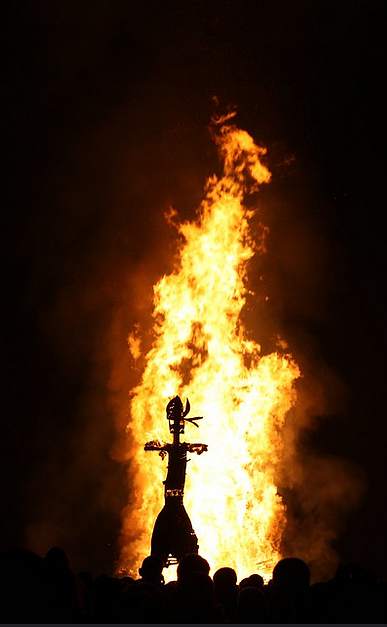
Guy Fawkes and Bonfire Night
A rather English celebration
Advanced level English
Remember remember the fifth of November
 Thousands of effigies Guy
Fawkes are burned on bonfires on November 5th.
Thousands of effigies Guy
Fawkes are burned on bonfires on November 5th.In Britain there's no "National day", no "Britain day" and obviously – since Britain has not been colonised since Norman times – no Independence Day.
Instead Britain has Guy Fawkes day, also known as Bonfire Night, which is not even a public holiday, but is a day, or more exactly an evening, of great celebrations in towns and villages up and down the country. On the evening of November 5th, the night sky is ablaze with light from bonfires and the pyrotechnics of millions of fireworks. It looks like a National day, it sounds like a National day, but it is not; it's neither a celebration of the founding of the modern state, nor the commemoration of a moment of constitutional change.
Nor indeed is it a day to remember a father of the nation, since Guy Fawkes was neither a statesman nor a great political leader. Quite the opposite; he was a criminal, potentially a mass murderer, and is celebrated not for what he did, but what he failed to do, which was to blow up the Houses of Parliament in London, during the Opening of Parliament in the presence of the King, in the year 1605.
If the "Gunpowder plot" had succeeded, then November 5th might well have become England's national day, the day on which its parliamentary democracy was undone and replaced by an autocratic Catholic monarchy, a kind of royal dictatorship of the type that existed in continental Europe at the time. But that did not happen; someone spilt the beans, and before Fawkes and his conspirators had time to carry out their deadly deed, the barrels of gunpowder that had been sneaked into the cellars underneath the Westminster parliament building were discovered, and the plot was foiled .
People have been remembering the event ever since, and each year on the night of November 5th bonfires are lit all over Britain and effigies of Guy Fawkes, known as "the Guy", are burned on them. While it is not a National day, Guy Fawkes Day began life as an official holiday in 1606, when Parliament ordered people throughout England to celebrate the failure of Fawkes and his conspirators. Each parish had to hold a service of Thanksgiving, and attendance was mandatory .
In times before the mass media, many people needed to be reminded what they were remembering, and songs and stories were made up for the purpose. The best known of these is the very popular rhyme Remember, remember the fifth of November, Gunpowder treason and plot" , which has been known and recited for many generations. (1).
In the absence of any National day, Bonfire Night remains to this day the biggest moment in the year for firework displays in the United Kingdom. Although laws governing the sale and use of fireworks, and the rising cost and technicity of fireworks, have put limits on the multitude of free-for-all backyard firework displays that used to take place, bonfires are lit throughout the British Isles on the evening of November 5th, and thousands of effigies of Guy Fawkes are burned as fireworks light up the night sky. The date of November 5th is a perfect time for this, coming at a time of year when the night is long and the ground is generally damp, thus reducing the risk of unintended fires and making the festivities family events; it's also the middle of autumn, a time when the outdoor activities of summer have come to an end. It's a moment for excitement and festivities in an otherwise dull time of year, and for many people it's the day after which thoughts can be turned to the next big festivity, Christmas.
What was the Gunpowder Plot ?
In the year 1605, England was a Protestant country where certain individual liberties had been guaranteed by law for almost 400 years. Since the 16th century, Europe had been divided into two blocs, the Catholic countries (essentially the Hapsburg empire) and the Protestant nations.
England had converted to Protestantism in the time of King Henry VIII, but there were still plenty of people, particularly in the aristocracy, who were nostalgic for the Catholic cause. Guy Fawkes was one of them, though he was not the ringleader, just the one who happened to be guarding the 36 barrels of gunpowder stocked beneath the House of Lords when, working on a tip-off, the guards came round.
The plotters were led by a man called Robert Catesby, whose plan was to blow up the English Parliament during its opening session in the presence of King James I. After that, English Catholics would rise up in revolt, set up a new government, and the authority of the Catholic church would be reasserted.
Hero or villain?
While Guy Fawkes is generally remembered as a villainous traitor who tried in vain to destroy the English King and his parliament, historic facts have all too often been forgotten. Taken out of context, Guy Fawkes has even been turned into a hero, and seen as an anarchist martyr whose aim was to get rid of elites (the king and parliament) and give power back to the "people"; his face has been used by hacker groups and activists of the left and the right, notably the group Anonymous, as a symbol of the fight against establishment powers and hierarchies.
It's ironic and an interesting insight into how images can take on their own life, with little relevance to reality, that twenty-first century anarchists can iconize a man whose ideals were neither libertarian nor democratic. Though certainly a revolutionary in his way, Guy Fawkes was basically a middle class religious fanatic whose objective was not to give power to the people, but turn the clock back in favour of Catholic power that was more hierarchical, more aristocratic and less tolerant than the Protestant parliamentary system that had replaced it.
Note: 1. The lines Remember, remember the fifth of November are just the first two lines of a longer poem, but were not written by John Milton, as is often claimed. In the year 1626 the young Milton did write a poem about the failed plot, but it was in Latin , was much longer, and bears no similarity to the popular rhyme, whose origins are unknown.
WORDS:
fireworks: pyrotechnics, decorative displays of fire - blow up: cause an explosion - carry out: do, realise - service: Protestant mass - dull: not very bright - working on a tip-off: having been alerted - in vain: without any success.
Pronunciation: Guy is pronounced like buy or fly; Fawkes is pronounced like forks. Printing: Optimized for printing.
Copyright © Linguapress renewed 2025. Do not copy this document to any other website
Copying permitted for personal study, or by teachers for use with their students
LINGUAPRESS ADVANCED ENGLISH - STUDENT WORKSHEET
Guy Fawkes and the Gunpowder plotInteractive: Text correction:
Correct the twenty mistakes in this badly copied extract from the article.
The mistakes cover spelling, word use and grammar.
The copy below is editable, i.e. you can make changes to it directly on your computer screen.
The text in the box can be directly edited, and the new text you type will show in red. To print or save your changes, either print the page, or save it as a .pdf file.
Do this exercise with or without consulting the original article. If you compare the two texts, this is an exercise in careful reading (a highly useful exercise!); if you look at the text below without looking at the original article, it will be an exercise in grammar, memory and logic. The second variant of this exercise can usefully done by students working in pairs; you will need to argue with each other in order to reach agreement over what is wrong, and what the original text actually said.
In the year 1605, England was a Protestant country where certain individuals liberties had been guaranteeing by law since almost 400 years. Since the 16th century, Europe has been divided into two blocs, the Catholic countries (essentially the Hapsburg empire) and the Protestant nations.
England have converted to Protestantism in the time of King Henry VIIIth, but there were yet plenty of people, particularly in the aristocrats, who were nostalgic for the Catholic case. Guy Fawkes was one of they, though he was no the ringleader, just the one who happened to be guard the 36 barrels of gunpowder stocking beneath the House of Lords when, working on a tip-off, the guards came up.
The plotters were lead by a man called Robert Catesby, who plan was to blow up the English Parliament while its opening session in the present of King James I. After that, English Catholics will rise up in revolt, install a new government, and the authority of the Catholic church would be reasserted.
Interactive: Negation:
Replace all the words
that are missing from this extract. All the missing words
serve to express negation,
mostly by use of a negative particle (such
as no or not),
but sometimes by using phrases with a
negative meaning.
Instead Britain has Guy Fawkes day, also known as Bonfire Night, which is even a public holiday, but is a day, or more exactly an evening, of great celebrations in towns and villages up and down the country. On the evening of November 5th, the night sky is ablaze with light from bonfires and the pyrotechnics of millions of fireworks. It looks like a National day, it sounds like a National day, but it is ; it's a celebration of the founding of the modern state, the commemoration of a moment of constitutional change.
indeed is it a day to remember a father of the nation, since Guy Fawkes was a statesman a great political leader. Quite the opposite; he was a criminal, potentially a mass murderer, and is celebrated for what he did, but what he , which was to blow up the Houses of Parliament in London, during the Opening of Parliament in the presence of the King, in 1605.
If the "Gunpowder plot" had succeeded, then November 5th might well have become England's national day, the day on which its parliamentary democracy was and replaced by an autocratic Catholic monarchy, a kind of royal dictatorship of the type that existed in continental Europe at the time. But that did happen; someone spilt the beans, and before Fawkes and his conspirators had time to carry out their deadly deed, the barrels of gunpowder that had been sneaked into the cellars underneath the Westminster parliament building were discovered, and the plot .
© linguapress.com
Lesson plan / For teachers
Ideas for the classroom
Introduction: With is missing words, this text is ideal for use collectively with a class, specially in a classroom fitted with connected projector or whiteboard.As a warm up, ask students what fireworks are, and when we tend to use them. Then ask what they understand by a national day. Your country probably has one, so what does it celebrate? And why? Does it celebrate famous heroes? Could it celebrate terrorists? It is perhaps important to remember that one man's hero may be another man's terrorist – though depending on local circumstances, it may be judicious not to link this to any situation in the country in which you are teaching.
After breaking the ice, read through the article with your students, and click on the dropdown box arrows as you come to them, so that students can choose the right answers.
Grammar to watch- Negation
This text deliberately includes a lot of examples of negation, not just examples that put the verb in a negative form, but examples that include negarive correlating coordinators, negation attached to nouns, and negation through words whose meaning includes negation.... undone and was foiled (was prevented or stopped).For a full presentation of the different ways of expressing negation in English, with lots more eamples, see section 4.5 (ps 166-170) in A Descriptive Grammar of English
After studying the text
Take the two interactive exercises.Negatives:
For the exercise on negatives, depending on your classroom environment and on the level of your students, you may or may not want to allow students to refer back to the original text while doing this exercise. Taken as a class exercise projected on a screen or whiteboard, this exercise is easiest to manage without referring back to the text; the answers should not be too hard to find.Text correction exercise.
The twenty wrong words that need to be replaced have all been carefully selected to exploit common errors and difficulties. They include the pluralizing of adjectives, use of auxiliaries and modals, use of participles, adverbs, pronouns (personal and relative), prepositions and spelling.
Two errors that are easy to miss are a) the presence of th after VIII; though this is pronounced, it is never written. And b) the very common spelling mistake were lead. No, it's were led. Lead is only pronounced [led] when it refers to a type of metal.
For other mistakes, check the original text.



 Copyright
information.
Copyright
information.